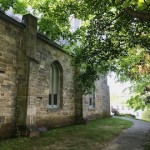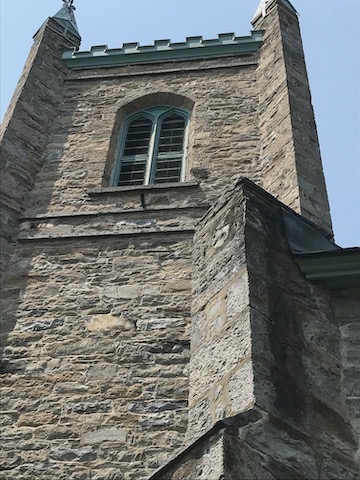Let me open this post by clearing the air (as it were), by noting first it’s been a while since my last post – April of this year to be exact. We’ve had some rough weather here in Vermont with the floods and the wildfire smoke and that hasn’t exactly been conducive to thoughtful writing.
With that out of the way, let me explore a subject I’ve been thinking about lately, as I’ll soon be officiating Morning Prayer at my Episcopal Church here in Brandon, VT on July 30th. I’m not licensed to preach yet but I’ll be able to offer a reflection. One of the topics I’ve been considering at the moment is King David and his lyre, along with the Psalms.
I’d like to build that out here a little bit on my blog. A lot of times, when people hear that I’m “in music”, the first thing they think of or ask about is, do I play in a band or some such thing. The answer to that is a firm no. I’m decidedly not a fan of rock music, noisy overdriven guitars, screechy howling vocals and the general mayhem that seems to serve as entertainment in our secular world. This comes as a shock to the average person, perhaps because they don’t know of or listen to anything else or maybe it’s just so commonplace now people don’t realize there was a time before all this amplified raucousness existed. And it was not that long ago really. I find the average American tends to define “music” as such, as that which exists in the popular imagination within the last half century.
Be that as it may, I grew up (I’m a Gen-Xer by the way) NOT liking that kind of thing, instead studying classical piano (Debussy and Ravel were favorite composers) and deciding I wanted to pursue traditional sacred music in college. Notice the word traditional. My parents were solid Silent Generation Traditionalists and passed their values down to me, which I also share with my husband organist/carillonneur George Matthew Jr. (who by the way, has played every single organ composition of J. S. Bach…. Every. Single. One.)
Palestrina. Gregorian chant. Organum. Polyphonic Renaissance choral music. Roman Catholic pipe organ music. My understanding and awareness of traditional church music (before I became Episcopalian in mid-life).
As a harpist, I’ve explored ways to bring the Psalms to life on my Irish wire-strung harps in church on Sunday morning. There are notated versions of the Psalms, developed from research into Hebrew scripture and how David may have originally played them on his kinnor or lyre, which probably had either 10 or 12 strings. At present, I have two collections of them and as I’ll be speaking from the podium on that Sunday morning, I’ll be relying on my organist husband George to illustrate my presentation with a few phrases from selected Psalms on our church’s pipe organ to demonstrate how they sound.
So David played his lyre (or kinnor) as an accompaniment to his sung prayer to our Lord as he tended his flock in the fields. Perhaps there were days when he didn’t sing, maybe he tried his hand at virtuoso lyre playing (!) or maybe not. Anyway, it’s a sure thing he wasn’t amplified. He wasn’t surrounded by an “audience” or “fans” as he played “The Music” while people gushed over his “talent”. He was praying. And playing. David had a lot of problems, and one way to deal with them was to pray and talk to God and seek his consul.
This is what church music is. We’re not there to entertain. We’re not there to “perform” and “put on a show”. We are, like David, praying to our Lord.
Yes, I’ve heard the arguments that there is no distinction between sacred and secular music. But I beg to differ. Entertainment-driven music is designed for that purpose, to focus attention on itself and the performer and not to settle the mind and spirit in preparation for encounter with the One. Communion is for me, perhaps, the highlight of the morning and the moment when I play my harp at its softest. At the moment when I receive the consecrated Host, I stop playing and for an interval there is silence in the church as I pray, reflect and give thanks before returning to the strings of my instrument, to provide a soft backdrop to others receiving the bread and wine of life.
This is probably not what I will say on the morning I officiate, because my congregation understands this well and instinctively. But for non church-goers, it always amazes me how many times I need to get this idea across. Church music is not a show. My harp is not loud and distorted in a harsh, ugly way. We blend ourselves in with the singing congregation as we play. Sometimes during Prayers of the People folks cry in response to difficulties in their life or they may celebrate requests to prayers granted. We support them in their journey, as God gives them strength and listens. We give thanks for all we have been blessed with and we seek to support others in our community. We welcome new visitors and invite them back next week. Sometimes those new faces become our most active new members and our strongest supporters, helping those in greatest need. And sometimes those new faces are incredibly talented musicians and humble spirits. They do not seek the limelight, but seek to serve.
Soli Deo Gloria.


